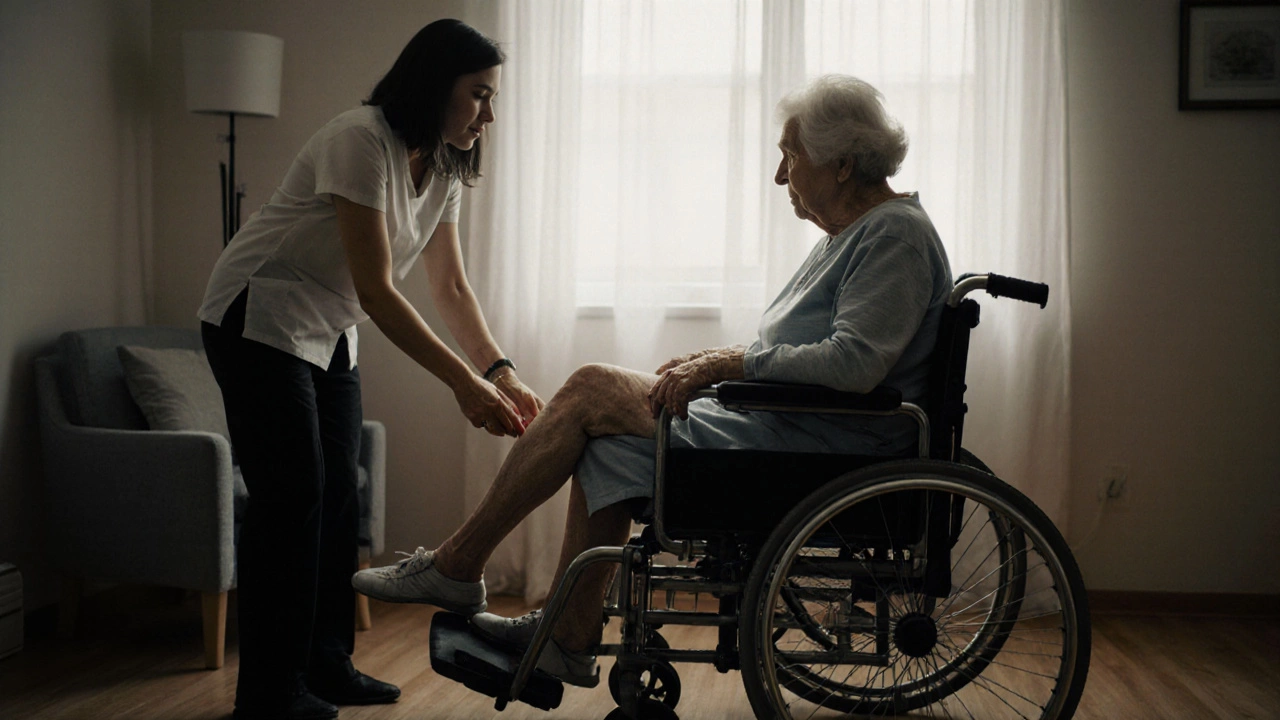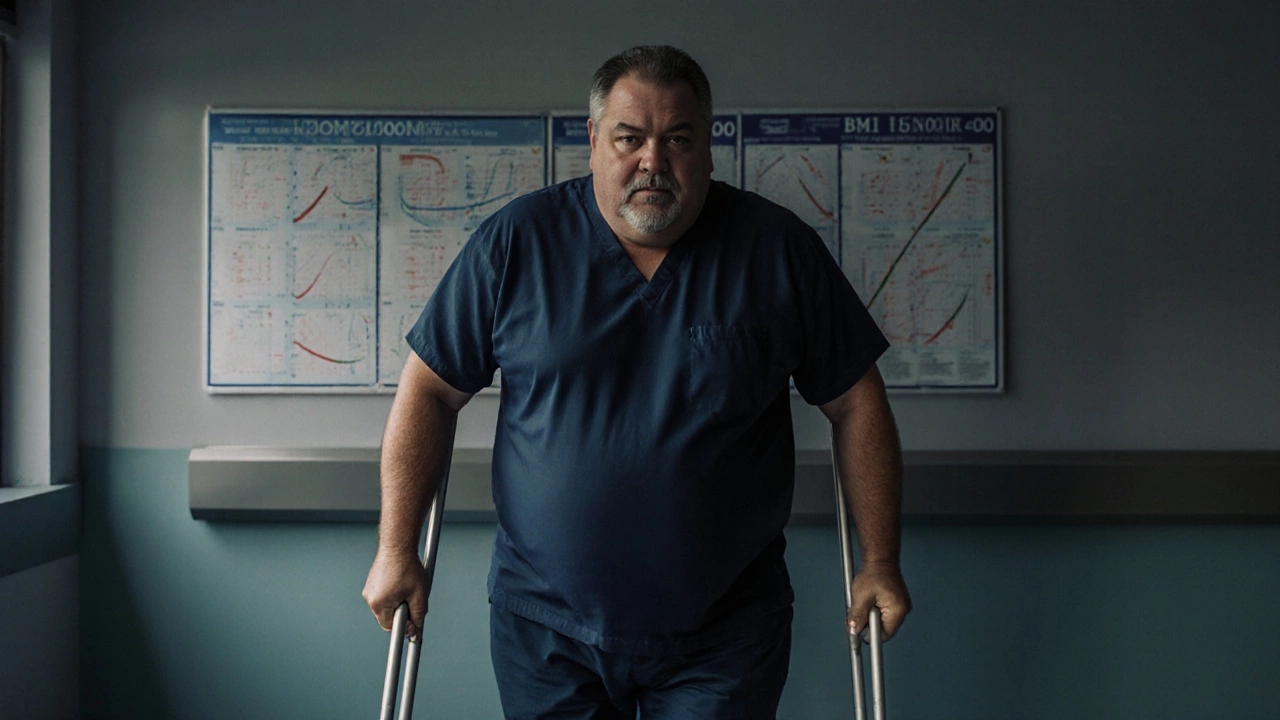Knee Replacement Candidate Assessment
Assess Your Suitability
This tool helps you understand if you're a good candidate for knee replacement based on the medical criteria discussed in the article. This is not medical advice, but can help guide your conversation with your doctor.
1. Weight & BMI
2. Active Infections
3. Movement & Neurological Health
4. Activity Level
5. Mental Health & Compliance
6. Skin & Circulation
7. Understanding the Commitment
Your Assessment Results
Not everyone with knee pain needs a total knee replacement. In fact, for some people, the surgery can do more harm than good. If you’re considering this procedure, it’s critical to understand who benefits-and who doesn’t. Total knee replacement isn’t a cure-all. It’s a major surgery with a long recovery, and it only works well when the patient’s body and lifestyle are aligned with the demands of the implant.
Severe Obesity Makes Recovery Harder
People with a BMI over 40 are at significantly higher risk of complications after knee replacement. Studies show these patients are 2 to 3 times more likely to need a second surgery within five years. Why? Extra weight puts pressure on the new joint, increasing wear and loosening the implant. It also makes physical therapy harder. Walking with crutches or a walker is exhausting when you’re carrying 100 extra pounds. Many patients with severe obesity don’t regain full mobility because their bodies can’t support the rehab process.
Before surgery, doctors often recommend weight loss-even a 10% reduction in body weight can cut surgical risks in half. If you haven’t tried diet, exercise, or medical weight management, surgery isn’t the next step. It’s a last resort.
Active Infections Are a Hard Stop
If you have an active infection anywhere in your body-skin, urinary tract, lung, or even a tooth abscess-you cannot have knee replacement surgery. Bacteria can travel through your bloodstream and settle into the new joint. Once that happens, the implant becomes infected. Treating an infected knee replacement often requires removing the implant, months of IV antibiotics, and sometimes permanent disability.
Even a mild urinary infection or a lingering sinus infection can delay surgery for weeks. Surgeons will run blood tests and sometimes urine or swab cultures before approving you. If your infection isn’t fully cleared, the answer is no. No exceptions.
Neurological Conditions That Affect Movement
People with uncontrolled Parkinson’s disease, advanced multiple sclerosis, or severe stroke-related muscle weakness often can’t participate in the physical therapy needed to make a knee replacement work. The implant doesn’t move on its own. It relies on your muscles to bend and straighten the knee. If your brain can’t send clear signals to your leg muscles, the joint won’t function properly.
Some patients with mild nerve damage from diabetes can still have successful surgery. But if you can’t lift your foot, drag your leg, or hold a straight leg in the air for more than five seconds during a physical exam, your chances of a good outcome drop sharply. Physical therapists will assess your strength and coordination before clearing you for surgery.

Young, Highly Active Patients May Outwear the Implant
Total knee replacements typically last 15 to 20 years. That’s fine for someone in their 60s or 70s. But if you’re 45 and play basketball twice a week, hike every weekend, or work as a construction worker, you’re likely to wear out the implant before you turn 60. Revisions are more complex, riskier, and less successful than the first surgery.
For younger, active people, doctors often suggest alternatives first: cartilage repair, partial knee replacement, or regenerative therapies like stem cell injections. These options preserve your natural bone and give you more flexibility for future treatments. If you’re determined to avoid surgery, you’re not being stubborn-you’re being smart.
Severe Mental Health Conditions Can Block Recovery
Depression, untreated anxiety, or severe cognitive impairment can make recovery nearly impossible. Recovery from knee replacement isn’t just about healing your leg-it’s about showing up for therapy, following pain management plans, and sticking to daily exercises. If you’re too depressed to get out of bed, or if you forget to take your blood thinners because of memory issues, your body won’t heal properly.
Patients with dementia or severe Alzheimer’s rarely benefit from knee replacement. They can’t understand why they need to do exercises. They may pull out IV lines or refuse to walk. Family members might think surgery will improve quality of life-but often, it leads to more hospital stays, confusion, and falls.
Before surgery, mental health screening is standard. If you’re on antidepressants, your doctor will ask how long you’ve been stable. If your mood has been up and down, they may delay surgery until you’ve been consistent for at least three months.
Poor Skin or Circulation Around the Knee
If your skin around the knee is thin, scarred from old injuries, or constantly broken down from eczema or ulcers, the surgical incision won’t heal well. Poor circulation-common in smokers or people with advanced diabetes-means less oxygen and nutrients reach the surgical site. This increases the risk of infection, wound breakdown, and even implant failure.
Surgeons will check your pulses in your foot and look at the color and texture of your skin. If your leg feels cold, looks pale, or has sores that won’t heal, they’ll refer you to a vascular specialist first. No surgery until circulation improves.

People Who Don’t Understand the Commitment
Some patients think knee replacement means instant pain relief. It doesn’t. The first six weeks are painful. You’ll need help getting dressed, using the bathroom, and walking. Many people return to normal activities by three months, but full recovery can take a year.
If you expect to be back to gardening, climbing stairs, or playing with grandchildren in two weeks, you’re setting yourself up for disappointment. Surgery requires discipline. You need to do your exercises even when you’re tired. You need to ice your knee, elevate it, and take meds on schedule. If you’ve skipped physical therapy before, or if you’ve given up on other treatments because they were hard, knee replacement probably won’t be different.
What If You’re Not a Candidate? What Then?
Not being a candidate doesn’t mean you’re stuck with pain. There are other options:
- Partial knee replacement: Only replaces the damaged part of the knee. Better for younger patients with isolated arthritis.
- Physical therapy: Strengthening muscles around the knee can reduce pressure on the joint. Many patients avoid surgery entirely with consistent therapy.
- Weight loss programs: Even modest weight loss reduces knee pain significantly.
- Injectable treatments: Cortisone shots, hyaluronic acid, or platelet-rich plasma can help manage pain for months or years.
- Braces and assistive devices: A good knee brace or cane can improve mobility without surgery.
The goal isn’t always to remove the knee. It’s to help you move better, with less pain, for as long as possible. Sometimes, that means waiting. Sometimes, it means choosing a different path.
Can I still have knee replacement if I’m diabetic?
Yes, but only if your blood sugar is well-controlled. HbA1c levels below 7% are ideal. High blood sugar slows healing and increases infection risk. Your doctor will check your levels and may ask you to see an endocrinologist before surgery. Poorly controlled diabetes is a major red flag.
Is knee replacement safe for older adults?
Yes, and it’s often very successful. People in their 70s and 80s frequently have the best outcomes because they’re less active and have fewer demands on the joint. Age alone isn’t a barrier-overall health is. If you’re otherwise healthy, even at 85, knee replacement can restore independence and reduce fall risk.
What if I’ve had previous knee surgery?
Previous knee surgery doesn’t automatically disqualify you. But it makes the procedure more complex. Scar tissue, bone loss, or hardware left from past operations can make implant placement harder. Your surgeon will review your old records and imaging. Many patients with prior surgeries still get good results, but recovery takes longer.
Can I have knee replacement if I smoke?
Smoking increases infection risk by 300% and slows bone and tissue healing. Most surgeons require you to quit smoking at least 4 to 6 weeks before surgery and continue abstaining for 3 months after. If you can’t quit, they may refuse the surgery. Nicotine patches or gum aren’t enough-you need to stop all nicotine.
Will insurance cover knee replacement if I’m not a good candidate?
Insurance companies require medical justification. If your doctor says you’re not a good candidate, they may deny coverage. Even if they approve it, you’ll likely pay more out of pocket because complications increase costs. Insurance doesn’t pay for risky procedures with low success rates.
Final Thought: Surgery Is Not the Only Option
Too many people feel pressured into knee replacement because they believe it’s the only way to relieve pain. It’s not. For many, the best solution is a combination of lifestyle changes, targeted therapy, and time. The goal isn’t to fix your knee with metal-it’s to help you live better. Sometimes, that means waiting. Sometimes, it means choosing something less final.
